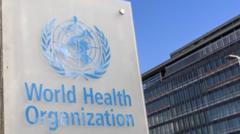On January 20, newly inaugurated US President Donald Trump took immediate action by signing an executive order aimed at initiating the withdrawal of the United States from the World Health Organization (WHO). This marks another critical chapter in Trump’s fraught relationship with the international health agency, primarily due to its response to the Covid-19 pandemic.
US Reconsiders WHO Membership as Trump Signs Withdrawal Order

US Reconsiders WHO Membership as Trump Signs Withdrawal Order
President Trump’s new executive order to withdraw the US from the World Health Organization raises concerns over global health leadership.
Upon returning to the White House, Trump acknowledged the significance of this decision, stating, “Oooh, that's a big one” as he signed the document, which was among numerous executive actions executed on his first day back in office. The move comes as Trump reiterates his administration's criticism of the WHO during the pandemic, claiming the organization mishandled the outbreak and was unduly influenced by China.
Previously, Trump had initiated a withdrawal process during his first term but was countered by President Joe Biden, who reversed that action. Now, with a renewed commitment to withdraw, Trump has positioned the WHO's organizational structure and alleged mismanagement at the center of his justification. His executive order stated that the US withdrawal stems from the organization’s "failure to adopt urgently needed reforms" and "inability to demonstrate independence," coupled with the US being burdened by excessive financial contributions.
Historically, under Biden’s leadership, the US emerged as the largest contributor to WHO, providing nearly 20% of the organization's $6.8 billion budget. The immediate repercussions of a US withdrawal could be profound, potentially crippling WHO's capabilities to respond to public health crises and worsening the fight against infectious diseases like malaria, tuberculosis, and HIV/AIDS. Prominent public health experts, including Ashish Jha—former Covid-19 response coordinator under Biden—have expressed deep concerns that such a withdrawal would not only impair global health but also diminish US leadership in international health arenas.
Lawrence Gostin, a Georgetown University public health authority, described the withdrawal as “a grievous wound to world health.” Additionally, there are fears that US exit could inadvertently bolster Chinese influence within the agency rather than mitigate it.
While some proponents of the withdrawal argue that it could spearhead necessary reforms within WHO, the prevailing sentiment in Washington indicates that this withdrawal under Trump will not be re-evaluated. The complexities of this decision mark a pivotal moment for global health governance at a time when collaboration is critical for addressing emerging health threats.
As Trump continues to assert his policies, the world's attention is sharply focused on how this withdrawal will alter the dynamics of international health cooperation.
Previously, Trump had initiated a withdrawal process during his first term but was countered by President Joe Biden, who reversed that action. Now, with a renewed commitment to withdraw, Trump has positioned the WHO's organizational structure and alleged mismanagement at the center of his justification. His executive order stated that the US withdrawal stems from the organization’s "failure to adopt urgently needed reforms" and "inability to demonstrate independence," coupled with the US being burdened by excessive financial contributions.
Historically, under Biden’s leadership, the US emerged as the largest contributor to WHO, providing nearly 20% of the organization's $6.8 billion budget. The immediate repercussions of a US withdrawal could be profound, potentially crippling WHO's capabilities to respond to public health crises and worsening the fight against infectious diseases like malaria, tuberculosis, and HIV/AIDS. Prominent public health experts, including Ashish Jha—former Covid-19 response coordinator under Biden—have expressed deep concerns that such a withdrawal would not only impair global health but also diminish US leadership in international health arenas.
Lawrence Gostin, a Georgetown University public health authority, described the withdrawal as “a grievous wound to world health.” Additionally, there are fears that US exit could inadvertently bolster Chinese influence within the agency rather than mitigate it.
While some proponents of the withdrawal argue that it could spearhead necessary reforms within WHO, the prevailing sentiment in Washington indicates that this withdrawal under Trump will not be re-evaluated. The complexities of this decision mark a pivotal moment for global health governance at a time when collaboration is critical for addressing emerging health threats.
As Trump continues to assert his policies, the world's attention is sharply focused on how this withdrawal will alter the dynamics of international health cooperation.





















